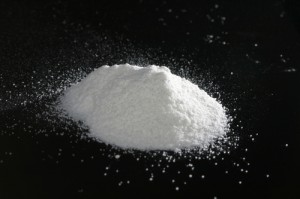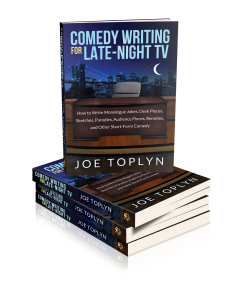Some news items are easier to write multiple jokes about than others. Monologue writers like those news items because cranking out several jokes about the same news item takes less time than hunting down other promising news items and then writing jokes about those.
So what makes a news item a good candidate for multiple jokes, or, as I say, fertile?
The answer lies in the handles of the news item. The handles are the most attention-grabbing words or phrases in the news item, those details that stand out the most.
Take this headline that I saw recently on the ABC News website:
“Spain: Woman Arrested With Coke in Breast Implants”
 One reason that headline lit up on my joke topic radar was because it has two handles and each handle has a lot of associations, which are words or phrases that come to mind when you think about something. Two handles with a lot of associations make a news item fertile because linking handles using their associations is one of the main ways to create punch lines. So the more associations, the more possible punch lines.
One reason that headline lit up on my joke topic radar was because it has two handles and each handle has a lot of associations, which are words or phrases that come to mind when you think about something. Two handles with a lot of associations make a news item fertile because linking handles using their associations is one of the main ways to create punch lines. So the more associations, the more possible punch lines.
Here’s how that principle works in practice. In the above news item the two handles are “coke” and ”breast implants.” The associations of “coke” include “Colombia,” “snort,” “Coca Cola,” and lots of others. The associations of “breast implants” include “D cup,” “silicone,” “Pamela Anderson,” and many more.
Linking associations like those using Punch Line Maker #1, described in my book, I wrote this joke and posted it on Facebook:
 “In Madrid, police arrested a woman with 4 lbs. of cocaine hidden in her breast implants. Her bra was from Victoria’s Secret Stash.”
“In Madrid, police arrested a woman with 4 lbs. of cocaine hidden in her breast implants. Her bra was from Victoria’s Secret Stash.”
Then I added a pop culture association to the mix, used my Punch Line Maker #2, and posted another joke:
 “In Madrid, police arrested a woman with 4 lbs. of cocaine hidden in her breast implants. The good news: she’s now engaged to Charlie Sheen.”
“In Madrid, police arrested a woman with 4 lbs. of cocaine hidden in her breast implants. The good news: she’s now engaged to Charlie Sheen.”
My comedy writer friend Gabe Abelson supplied a third punch line, this one using my Punch Line Maker #4:
“The good news about keeping four pounds of cocaine in your breast implants is they’ll stay up for about 50 years.”
And another comedy writer friend, Wayne Kline, also turned to Punch Line Maker #4 for this one:
“The clever DA lowered the thermostat in the trial room so the evidence will stand up in court.”
The point is that jokes flowed freely from that news item because it has two handles with a lot of associations. So focus first on news items like that when you’re hunting for possible joke topics.
Learn more about my six Punch Line Makers in my book Comedy Writing for Late-Night TV.

Good stuff as usual Joe. How do the writers get fed headlines now. I’ve heard several say the headlines are waiting for them when they come in.
Jay Leno’s and Dave Letterman’s monologue writers, among others, almost always came up with the topics for their jokes themselves, by reading and watching the news.
But yes, on other shows a non-writing staff member, like a production assistant, will select headlines for the writers to turn into jokes.
That might save a little time for the writers, who then don’t have to find topics themselves. But it may not result in the funniest collection of jokes, for these reasons:
1) A non-writer may miss many good joke topics.
2) The topics handed to the writers may not be worded in a way that maximizes the potential of the resulting jokes to be funny.
3) The writers are deprived of the chance to read more of the news story. That means the writers can’t see details farther down in the story that might spark a great joke.
Whoever is choosing the topics for jokes, I recommend using the guidelines in this post.